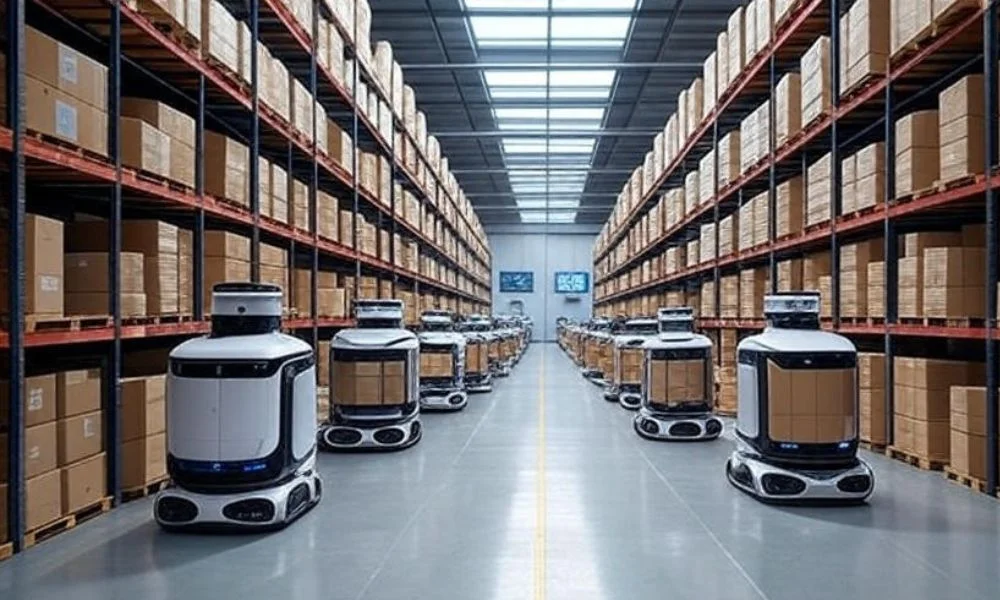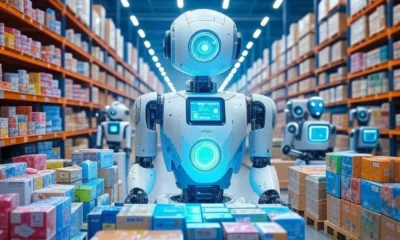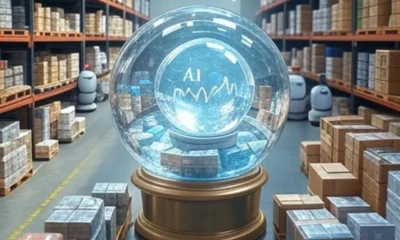Artificial Intelligence
Fully Autonomous Warehouses Are We There Yet?
Are fully autonomous warehouses already here or just futuristic hype? I explore the real tech, challenges, and what it means for U.S. logistics.

I’ve always been curious about how warehouse work keeps getting faster and more efficient every year. Recently, I’ve discovered that fully autonomous warehouses are at the center of this evolution. These smart facilities are not science fiction anymore, they’re happening right now and changing how we store, move, and ship things across America.
The way I see it, we’re in a race where machines, artificial intelligence, and robotics are working together to reshape logistics. As someone who’s watched this happen firsthand, I know this shift is not just about speed. It’s about survival, cost-cutting, and staying ahead in a competitive market.
Definition:
A fully autonomous warehouse is a place that does not require human assistance by means of AI, robotics and smart technology.
Understanding this definition helped me realize why this topic matters so much. Businesses in the U.S. are aiming for faster deliveries, lower costs, and fewer mistakes and autonomous systems make that possible.
In this article, I’ll break down everything I’ve learned about warehouse automation. From the companies leading the charge to the technologies making it work, I’ll walk you through what’s changing, what’s coming next, and why it matters to workers like me and maybe to you too.
Automation and the Evolution of Warehousing:
As I learnt about the warehouses, majority of the processes began and ended with human assistance with minimal digital assistance. Each box, shelf, and delivery relied on a person who lifted, scanned, or inspected things on their hands each day.
I witnessed how little steps transformed everything, as those allowed workers to improve their performance within the same time they worked without necessarily increasing the intensity.
Today, artificial intelligence and machine learning solutions enable processes in which a team of people used to work with clipboards and spreadsheets. I have myself witnessed cases where smart systems predict inventory demands, package delivery route and even forecast picking errors in advance.
Long Road Hitherto:
Way in which Warehousing Has Advanced with Automation. As I learnt about the warehouses, majority of the processes began and ended with human assistance with minimal digital assistance. Each box, shelf, and delivery relied on a person who lifted, scanned, or inspected things on their hands each day.
Are Companies Already Using Fully Autonomous Warehouses?
I’ve been following companies like Amazon, Ocado, and Alibaba because they’re leading the charge in warehouse automation today. They are stacked with robotics, AI, and smart routing devices, which turn most of their operations into the high-speed and very efficient processes.
I think it is amazing to see such setups but at this point, they are not that autonomous. Full autonomy implies no human intervention at all and that is also the exception. We are on the edge of it-but not yet living in a totally robotic warehouse world.
Which Technologies Work These Warehouses?
I look at the operation of these warehouses and I can see a strong combination of advanced equipment at work behind scenes every day. The technologies assist the machines in decision-making, the transportation of their products, and the tracking of operations with no need to depend on human reactions.
Here are the main technologies I’ve seen driving autonomy in smart warehouses
Artificial Intelligence and Machine Learning:
- Autonomous Mobile Robots (AMRs) These are robot devices that transport or move goods through robotic applications that move them point to point avoiding human beings and any other obstacle along their course.
Computer Vision Systems:
- These sensors can monitor temperature, storage, and machine health to prevent idle time or delays.
- Cloud-Based WMS Platforms The nature of Cloud-Based WMS platforms is to ensure that all systems communicate with the rest of the systems to ensure operations do not hitch at all times.
What Is A Preventative Full Autonomy in Warehouses?
Although I have witnessed some blocks working with wonderful technologies, I am pretty sure that there are a few large obstacles to full warehouse autonomy. Machine flexibility is one of them to be considered one of the greatest problems because even simple tasks are still problematic when it comes to odd-shaped, tender, or unpredictable objects.
The other actual issue that I have observed is error tolerance- AI can fail to perform when there is an abrupt change of condition or data input is not as expected. Such systems do not always perform well in exception management, and it is in this regard that people are still required to intervene promptly.
The other hindrances are the costly installation and maintenance mainly in small warehouses operating on narrower budgets. I have also heard the worker opposition to it out of job security threats, and regulative restrictions which makes it difficult to adopt widely in the U.S.
Is it a case that Human Jobs are Endangered or are they simply Changing?
I wondered at the beginning that AI was going to disrupt all the jobs in warehouses and workforce like me would not be able to make a living anymore. However, having seen how automation has developed, I now think that the majority of jobs are doing nothing more than transforming, rather than entirely vanishing.
I have witnessed how workers have given up picking boxes in favor of managing robots, sustaining systems, and controlling data that informs wiser operations of the warehouse. These new jobs also come with improved job safety, job satisfaction and future career development compared to their old occupations which only needed different skills.
I believe that the future of warehousing contains equal part of smart machines and smarter people. We are not being removed we are being re trained to work faster and easier with the high end technology.
Will Fully Autonomous Warehouses Be Common in 10 Years?
Based on everything I’ve seen, I believe fully autonomous warehouses will become more common in certain industries over time. The industries such as e-commerce, drug production and high traffic stores are squeezing to rush, precision and employment problems.
I have observed that the AI technology advances quickly, and robotics become cheaper, smarter, and more versatile in various warehouse conditions annually. Such trends indicate to me that complete autonomy is not something distant to large companies that have the funds and the volume to realize it.
Nevertheless, I believe that human and machine employment will be observed many years in the future, particularly in warehouses that work with complicated or delicate products. The full autonomy might come- however not to all and at once.
Does All Businesses Require Total Independence?
Based on what I have learned every warehouse does not necessarily benefit by becoming fully automated most especially smaller businesses and companies with limited resources. I have interviewed people in charge of warehouses and they have said that their business is doing well with people and partial automation.
That arrangement suits them just fine and helps them save money and still gain speed and accuracy where it counts the most.
As far as I am concerned, autonomous is not a universal remedy. Every company must consider its size, the type of products it deals with, and the other objectives before coming up with the amount of automation that is appropriate.
Conclusion:
Fully Autonomous Warehouses We’re Close, But Not Quite There Yet After everything I’ve explored, I believe fully autonomous warehouses are real but not yet widespread or practical for everyone.
Having been in the industry, I can report that automation is most effective when it assists and does not entirely take the place of human personnel. What is the right balance will be on your business needs, budget and how prepared your team is to change.
In my opinion you ought to begin making plans now. Did you need full autonomy or only a hybrid system of your warehouse? Are you willing to outsource laborious labors to machines? What do you say will be your role with increasing automation?
-

 Artificial Intelligence8 months ago
Artificial Intelligence8 months agoHow to Use Grok AI: A Complete Guide
-

 Artificial Intelligence10 months ago
Artificial Intelligence10 months agoWhat is Artificial Intelligence? A Comprehensive Guide for Businesses and Enthusiasts
-

 Artificial Intelligence9 months ago
Artificial Intelligence9 months agoUnlocking the Power of Artificial Intelligence Tools
-

 Artificial Intelligence9 months ago
Artificial Intelligence9 months agoWhat is DeepSeek? Revolutionizing AI with Cutting-Edge Solutions
-

 Artificial Intelligence5 months ago
Artificial Intelligence5 months agoAI Technologies in Warehouse Automation:
-

 Artificial Intelligence5 months ago
Artificial Intelligence5 months agoPredictive Analytics for Demand Forecasting:
-

 Artificial Intelligence6 months ago
Artificial Intelligence6 months agoMeta’s AI Push: The Standalone Assistant App Set to Rival ChatGPT
-

 Artificial Intelligence5 months ago
Artificial Intelligence5 months agoHow Artificial Intelligence is Revolutionizing Logistics:


